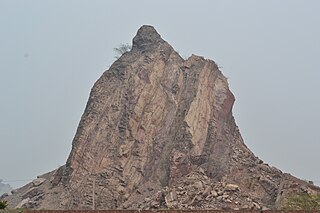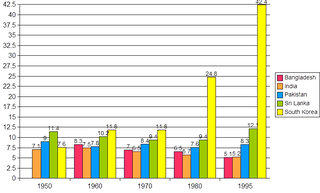 W
WBadr-A was the first artificial and the first digital communications satellite launched by Pakistan's supreme national space authority — the SUPARCO — in 1990. The Badr-A was Pakistan's first indigenously developed and manufactured digital communications and an experimental artificial satellite which was launched into low Earth orbit by Pakistan on 16 July 1990, through a Chinese carrier rocket. The launch ushered new military, technological, and scientific developments in Pakistan and also provided data on radio-signal distribution in the ionosphere. Originally planned to be launched from the United States in 1986, the Challenger disaster furthered delayed the launch of the satellite which changed the plan. After the People's Republic of China offered Pakistan to use its facility, the Badr-A was finally launched from Xichang Satellite Launch Center in 1990 on Long March 2E. Badr-A travelled at 17,500 miles per hour (28,200 km/h), taking 96.3 minutes to complete an orbit, and emitted radio signals at the 145 to 435 MHz bands which were operated by Pakistan Amateur Radio Society (PARS). The Badr-A successfully completed its designed life, and a new satellite was proposed to be developed.
 W
WBenazir Bhutto was a Pakistani politician who served as Prime Minister of Pakistan from 1988 to 1990 and again from 1993 to 1996. She was the first woman to head a democratic government in a Muslim majority nation. Ideologically a liberal and a secularist, she chaired or co-chaired the Pakistan Peoples Party (PPP) from the early 1980s until her assassination in 2007.
 W
WThis article covers the Afghan history from the Soviet withdrawal from Afghanistan on 15 February 1989 until 27 April 1992, the day after the proclamation of the Peshawar Accords proclaiming a new interim Afghan government which was supposed to start serving on 28 April 1992.
 W
WThis article covers a part of the contemporary Afghan history that started between 28 April 1992, the day that a new interim Afghan government was supposed to replace the Republic of Afghanistan of President Mohammad Najibullah, and the Taliban's conquest of Kabul establishing the Islamic Emirate of Afghanistan on 27 September 1996.
 W
WAfter the dismissal of Benazir Bhutto's first government on 6 August 1990 by President Ghulam Ishaq Khan on grounds of corruption, the government of Pakistan issued directives to its intelligence agencies to investigate the allegations. After the fourth national elections, Nawaz Sharif became the Prime Minister and intensified prosecution proceedings against Bhutto. Pakistani embassies through Western Europe—in France, Switzerland, Spain, Poland and Britain—were directed to investigate the matter. Bhutto and her husband faced a number of legal proceedings, including a charge of laundering money through Swiss banks. Though never convicted, her husband, Asif Ali Zardari, spent eight years in prison on similar corruption charges. After being released on bail in 2004, Zardari suggested that his time in prison involved torture.
 W
WThe Eighth Five-Year Plans for National Economy of Pakistan was a set of a centralized and planned economic goals and targets designed to strengthen the economic development and performance of Pakistan between 1993 and 1998.
 W
WSince the partition of British India in 1947 and creation of dominions of India and Pakistan, the two countries have been involved in a number of wars, conflicts and military stand-offs. The Kashmir issue and across the border terrorism have been the cause of conflicts between the two countries mostly with the exception of the Indo-Pakistani War of 1971 where conflict originated due to turmoil in erstwhile East Pakistan.
 W
WThe Islamabad Accord was a peace and power-sharing agreement signed on 7 March 1993 between the warring parties in the War in Afghanistan (1992–1996), one party being the Islamic State of Afghanistan and the other an alliance of militias led by Gulbuddin Hekmatyar. The Defense Minister of Afghanistan, Ahmad Shah Massoud, resigned his position in exchange for peace, as requested by Hekmatyar who saw Massoud as a personal rival. Hekmatyar took the long-offered position of prime minister. The agreement proved short-lived, however, as Gulbuddin Hekmatyar and his allies soon resumed the bombardment of Kabul.
 W
WThe Kirana Hills is a small and extensive rocky mountain range located in Sargodha, Pakistan. It is also a place of tourist attraction in Sargodha City. Locally known as "Black Mountains" due to its brownish landscape, its highest peak is about 980 feet (300 m).
 W
WThe Nationalisation process in Pakistan was a policy measure programme in the economic history of Pakistan, first introduced, promulgated and implemented by Prime Minister Zulfikar Ali Bhutto and the Pakistan Peoples Party to lay the foundation of socialist economics reforms to improve the growth of national economy of Pakistan. Since the 1950s, the country had undergone a speedy industrialisation and became an industrial paradise in Asia. But, as time progressed, the labour trade unions and labour-working class had increasingly strained relations with the industrial business oligarch class, having neglected to improve working conditions and failing to provide a healthy and safe environment for the workers in these industrial industries.
 W
WThe Non-nuclear aggression agreement is a bilateral and nuclear weapons control treaty between the two South Asian states, India and Pakistan, on the reduction of nuclear arms and pledged not to attack or assist foreign powers to attack on each's nuclear installations and facilities. The treaty was drafted in 1988, and signed by the Prime Minister Benazir Bhutto and her Indian counterparts, Rajiv Gandhi on 21 December 1988; it entered into force on January 1991.
 W
WOperation Clean-up, also known as Operation Blue Fox, was an armed military intelligence program led by the Sindh Police and Pakistan Rangers, with an additional assistance from the Pakistan Army and its related intelligence agencies. Planned by the FIA, Intelligence Bureau and launched under the directives of Prime Minister Nawaz Sharif in 1992, the program was more roughly pursued by upcoming Prime Minister Benazir Bhutto in 1993–94, as part of her internal policies.
 W
WOperation Gothic Serpent was a military operation conducted by United States special operations forces during the Somali Civil War with the primary mission of capturing faction leader Mohamed Farrah Aidid. The operation occurred in Somalia from August to October 1993 and was supervised by the Joint Special Operations Command (JSOC).
 W
WLarry Lee Pressler is an American politician from South Dakota who served in the United States House of Representatives and United States Senate as a Republican. He remained active in politics following his failed reelection campaign in 1996 and attempted to regain his former seat in 2014, but was unsuccessful.
 W
WThe Privatisation process in Pakistan is a continuous policy measure program in the economic period of Pakistan. It was first conceived and implemented by the then-people-elected Prime Minister Nawaz Sharif and the Pakistan Muslim League, in an attempt to enable the nationalised industries towards market economy, immediately after the economic collapse of the Soviet Union in 1989–90. The programme was envisaged and visioned to improve the GDP growth of the national economy of Pakistan, and reversal of the nationalisation programme in 1970s— an inverse of the privatisation programme.